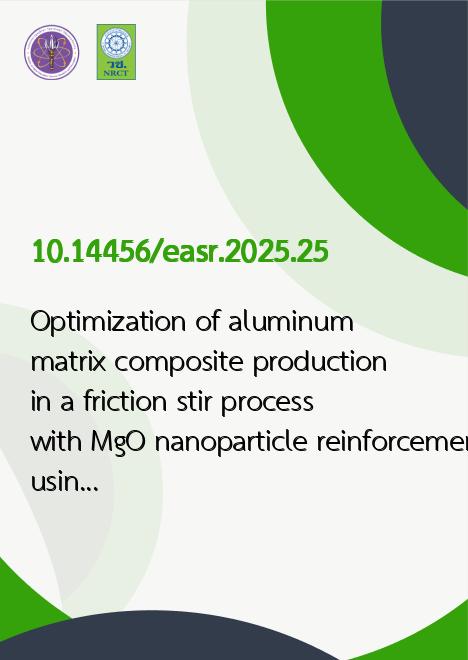
|
Optimization of aluminum matrix composite production in a friction stir process with MgO nanoparticle reinforcement using ANN-GRA modeling |
|---|---|
| รหัสดีโอไอ | |
| Creator | 1. Suriya Prasomthong 2. Thanatep Phatungthane 3. Chaiya Chomchalao |
| Title | Optimization of aluminum matrix composite production in a friction stir process with MgO nanoparticle reinforcement using ANN-GRA modeling |
| Publisher | Faculty of Engineering, Khon Kaen University |
| Publication Year | 2568 |
| Journal Title | Engineering and Applied Science Research |
| Journal Vol. | 52 |
| Journal No. | 3 |
| Page no. | 282-295 |
| Keyword | Aluminum Matrix Composites (AMCs), Friction Stir Processing (FSP), Artificial Neural Network (ANN), Grey Relational Analysis (GRA), Mechanical Properties Optimization |
| URL Website | https://ph01.tci-thaijo.org/index.php/easr/index |
| Website title | Engineering and Applied Science Research |
| ISSN | 2539-6161 |
| Abstract | This research focuses on enhancing the performance of magnesium oxide (MgO) particle-reinforced aluminum matrix composites (AMCs) using friction stir processing (FSP). The study addresses the limitations of traditional methods, such as response surface methodology (RSM), which often cannot accurately capture the nonlinear relationships between critical parameters. A hybrid model that integrates artificial neural network (ANN) and grey relational analysis (GRA) approaches is developed to improve prediction accuracy and optimize mechanical properties, particularly tensile strength and hardness. MgO particles offer significant advantages by refining the grain structure, enhancing hardness, and improving tensile strength due to their large surface area and thermal stability, thereby increasing the durability and wear resistance of the composites. The ANN model effectively analyzes complex nonlinear relationships, while the GRA technique identifies optimal production parameters. The results demonstrate that the ANN-GRA model outperforms RSM, showing lower mean squared error values and more accurate predictions closely aligned with experimental outcomes. The novelty of this research lies in integration of ANN and GRA to simultaneously optimize multiple FSP parameters, addressing a research gap in composite material improvement. This approach significantly enhances the mechanical properties of the composites while minimizing material and energy use during the production process. The findings of this study hold substantial implications for the aerospace and automotive industries, which require lightweight materials with superior properties. Additionally, this research serves as a foundation for future applications of hybrid machine learning techniques to efficiently and sustainably optimize composite material production. |